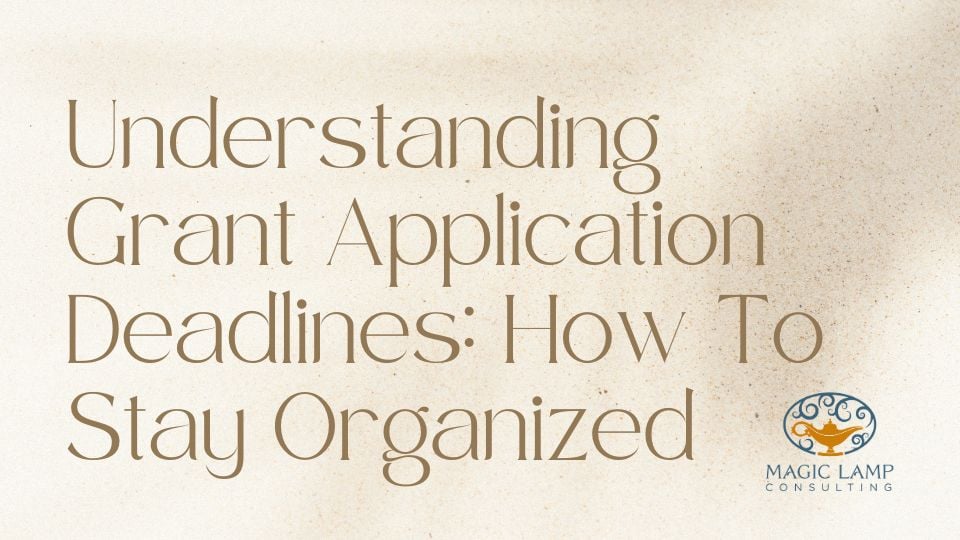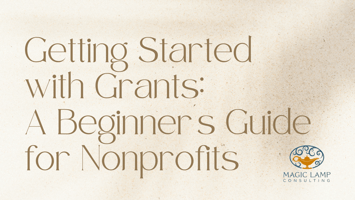Starting a nonprofit is an incredible way to make a difference, but securing funding to sustain...
Understanding Grant Application Deadlines: How to Stay Organized
 The world of nonprofit funding is built on deadlines. Grant application deadlines can be strict and unforgiving. Missing one can mean missing out on a significant source of funding for your nonprofit organization. However, staying organized and managing grant application deadlines effectively is not as daunting as it may seem. In this comprehensive blog post, the Magic Lamp Consulting team has put together ways you can explore the importance of understanding grant application deadlines and provide practical tips to help your nonprofit stay organized in the grant-seeking process.
The world of nonprofit funding is built on deadlines. Grant application deadlines can be strict and unforgiving. Missing one can mean missing out on a significant source of funding for your nonprofit organization. However, staying organized and managing grant application deadlines effectively is not as daunting as it may seem. In this comprehensive blog post, the Magic Lamp Consulting team has put together ways you can explore the importance of understanding grant application deadlines and provide practical tips to help your nonprofit stay organized in the grant-seeking process.
The Significance of Grant Application Deadlines
Grant application deadlines are not arbitrary; they serve several crucial purposes:
Fairness and Equity
Deadlines ensure that all applicants have an equal opportunity to apply for funding. They create a level playing field where applications are considered based on their merit rather than when they are submitted.
Efficient Allocation of Resources
Grantmakers need to allocate their resources efficiently, which includes setting aside time for proposal review and decision-making. Strict deadlines help them plan and manage their workflow effectively.
Project Timelines
Most grants are awarded for specific projects or initiatives, and grantmakers need to know when projects will begin and end. Timely submissions allow grantmakers to align their funding with project timelines.
Accountability
Grantmakers are accountable to their stakeholders, whether they are government agencies, private foundations, or corporate donors. Meeting deadlines is a sign of reliability and accountability.Now that we understand the importance of grant application deadlines let's dive into strategies to help you stay organized in the face of these critical dates.
Practical Tips for Staying Organized with Grant Application Deadlines
- Create a Master Calendar: Begin by creating a comprehensive calendar that includes all grant application deadlines. This calendar will be your central tool for keeping track of due dates.
- Set Reminder Alerts: Use digital tools like Google Calendar or project management software to set up reminder alerts for each grant application deadline. These reminders will ensure you never miss an important date.
- Prioritize Applications: Not all grant opportunities will be a good fit for your organization. Prioritize applications based on their alignment with your mission, the likelihood of success, and the potential impact of the funding.
- Break Down the Process: Grant applications can be complex, with multiple components, such as letters of intent, budgets, and supporting documents. Break down the application process into smaller, manageable tasks and assign deadlines for each.
- Centralize Documentation: Keep all relevant documentation, such as templates, letters of support, and financial records, in one centralized location. This will save time when you're ready to start a new application.
- Stay Informed: Subscribe to newsletters, mailing lists, or databases that provide information about grant opportunities. Staying informed about upcoming grants will give you ample time to prepare.
- Create a Submission Schedule: Determine when you will submit each grant application in relation to the deadline. Aim to complete applications well in advance to account for unexpected delays.
.webp?width=960&height=641&name=grant%20organization%20(1).webp)
Understanding The Role of a Grant Calendar
A grant calendar is an indispensable tool for managing grant application deadlines effectively. Here's how to create and use one:
Step 1: Gather Deadlines
Collect all grant application deadlines and relevant details. This information can come from grantmakers' websites, newsletters, grant databases, or your own records.
Step 2: Choose a Calendar Tool
Select a digital or physical calendar tool that suits your preferences and workflow. Popular digital options include Microsoft Outlook, Google Calendar, or project management software like Asana or Trello.
Step 3: Input Deadlines
Enter each grant application deadline as an event or task on your calendar. Include critical information such as the due date, grantmaker name, and a link to the application guidelines.
Step 4: Set Reminder Alerts
For each deadline, set up reminder alerts. These alerts can be configured to notify you days or weeks in advance, depending on your preferences.
Step 5: Color Code and Categorize
Color code grant deadlines based on their urgency or priority. You can also categorize them by grant type (e.g., government, foundation, corporate) or program area.
Step 6: Regularly Update
Consistently update your grant calendar as new opportunities arise or deadlines change.
Step 7: Share with the Team
If you're working with a grant team, share the calendar with team members. Collaboration and visibility are essential for effective deadline management.
Conclusion
Understanding and managing grant application deadlines is a fundamental aspect of successful grant-seeking for nonprofits. You can confidently navigate these deadlines by staying organized and utilizing tools like grant calendars. Remember that preparation and diligence are key to securing the funding your organization needs to positively impact your community.




